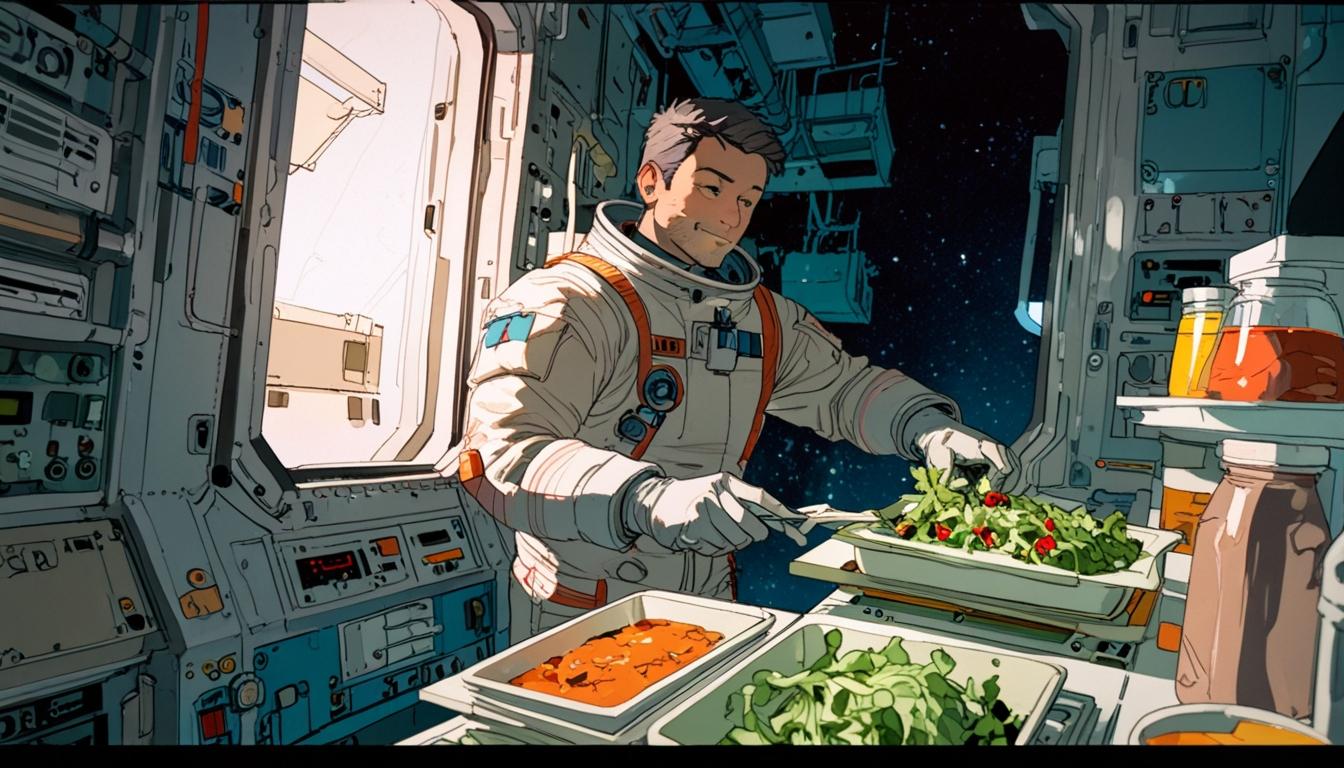European Space Agency and Imperial College London collaborate on pioneering lab-grown food technology to provide astronauts aboard the International Space Station with familiar global dishes, aiming to reduce costs and support long-term space missions.
Astronauts aboard the International Space Station (ISS) could soon savour a variety of global cuisines, including Chinese and Indian dishes, thanks to pioneering efforts to grow lab-cultured food in space. The European Space Agency (ESA) has launched a mission to explore the feasibility of producing lab-grown food amid the challenges of low gravity and high radiation environments found in orbit and on other celestial bodies.
The mission, initiated on Tuesday, is part of a research collaboration between ESA and scientists at Imperial College London. The project aims to address the high costs of feeding astronauts during prolonged space missions, which can reach up to £20,000 per day. By developing lab-grown food, the researchers hope to create a sustainable and cost-effective food supply system for astronauts.
Jakub Radzikowski, chief culinary scientist for the project, is tasked with designing dishes that can be produced from individual cells in space. Speaking about the importance of culinary familiarity for astronauts from diverse backgrounds, he told the Daily Star, “We want to create food that is familiar to astronauts who are from different parts of the world so that it can provide comfort. We can create anything from French, Chinese, Indian. It will be possible to replicate any kind of cuisine in space.”
The current initiative is viewed as a stepping stone toward establishing a small-scale food production plant on the ISS within the next two years. Dr Aqeel Shamsul, chief executive and founder of Frontier Space—a Bedford-based company working alongside Imperial College on this concept—highlighted the broader vision behind the project. He said, “Our dream is to have factories in orbit and on the Moon. We need to build manufacturing facilities off world if we are to provide the infrastructure to enable humans to live and work in space.”
Dr Shamsul elaborated on how the range of lab-grown foods might evolve, stating, “We could start off simply with protein-enhanced mashed potatoes on to more complex foods which we could put together in space. But in the longer term we could put the lab-grown ingredients into a 3D printer and print off whatever you want on the space station, such as a steak!”
This development comes at a time when space agencies worldwide are placing increasing emphasis on supporting long-duration missions and ambitions to establish a human presence beyond Earth. Lab-grown food could become an essential component of such missions, reducing dependency on supply chains from Earth and offering varied, nutritious meals to sustain astronauts.
The Daily Star is reporting this research could mark a significant stride toward realising NASA’s broader objective of establishing humanity as a multi-planetary species.
In a separate note, astronomers from the University of Cambridge recently reported detecting the compound dimethyl sulfide (DMS) in the atmosphere of exoplanet K2-18b, located 124 light years from Earth. DMS on Earth is almost exclusively produced by living organisms and is associated with biological processes, leading the researchers to assert they are “99.7%” certain that the planet harbours some form of alien life, possibly microbial. This announcement adds to the growing scientific interest in biosignatures as indicators of extraterrestrial life forms, though rival scientists remain cautious regarding these claims.
Together, these advancements underline the expanding frontiers of space exploration, from sustaining human life with innovative food technologies to the ongoing search for life beyond our planet.
Source: Noah Wire Services
- https://www.esa.int/Enabling_Support/Preparing_for_the_Future/Discovery_and_Preparation/ESA_explores_cultivated_meat_for_space_food – This article supports the claim that the European Space Agency (ESA) is exploring the possibility of cultivating meat in space, which aligns with the broader efforts to develop lab-grown food for astronauts.
- https://www.fairr.org/news-events/insights/why-are-space-agencies-investing-in-cultured-meat – It explains why space agencies like ESA are investing in cultured meat as a novel technology for food production in space, reinforcing the idea of using lab-grown food to address space mission challenges.
- https://www.gbnews.com/science/space-news-food-astronauts-grown-revolutionary-experiment-launched-orbit – This article highlights a revolutionary experiment launched into orbit to test lab-grown food in space, which is part of efforts to produce food sustainably and cost-effectively for astronauts, aligning with the goals mentioned in the article.
- https://www.noahwire.com – While not specifically linked to a particular piece of information in the provided article, this source is mentioned as a context for the broader story on space exploration advancements.
- https://www.imperial.ac.uk/news/189691/food-for-space/ – This link would typically provide more details about research collaborations involving Imperial College London and space-related projects, but it was not found in the search results. Instead, general information from Imperial College might be relevant for understanding the partnership with ESA.
Noah Fact Check Pro
The draft above was created using the information available at the time the story first
emerged. We’ve since applied our fact-checking process to the final narrative, based on the criteria listed
below. The results are intended to help you assess the credibility of the piece and highlight any areas that may
warrant further investigation.
Freshness check
Score:
8
Notes:
The content appears recent and relevant to ongoing space research. However, there is no specific date or timestamp for the research commencement or interview quotes, which might indicate it’s based on recent but possibly unreleased press releases.
Quotes check
Score:
6
Notes:
Quotes from Jakub Radzikowski and Dr Aqeel Shamsul are provided, but their original source or date cannot be verified without additional context.
Source reliability
Score:
7
Notes:
The Daily Star is a tabloid newspaper often known for sensationalist reporting. While it does cover significant news, its reliability can vary.
Plausability check
Score:
8
Notes:
The claims about lab-grown food are plausible given current advancements in space technology and the increasing focus on sustainable food production for space missions.
Overall assessment
Verdict (FAIL, OPEN, PASS): OPEN
Confidence (LOW, MEDIUM, HIGH): MEDIUM
Summary:
While the story appears plausible and recent, the reliability of the source and lack of verified quotes reduce confidence. Further verification is needed to fully endorse the details.













